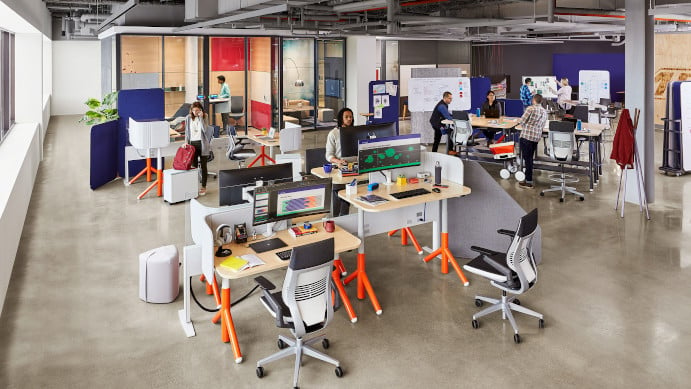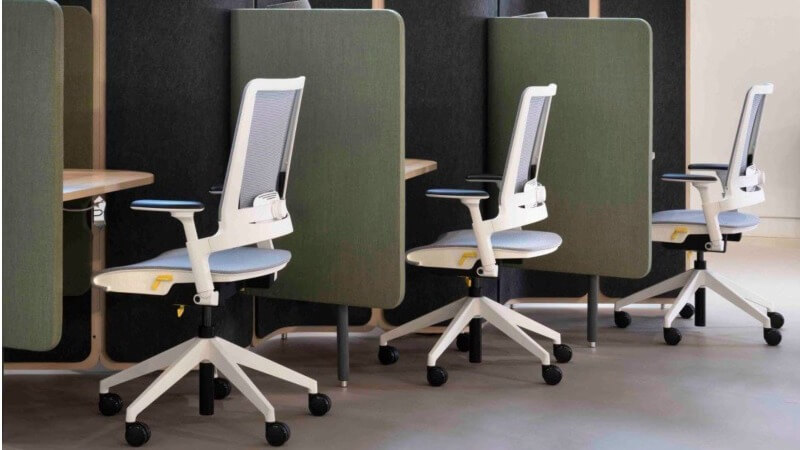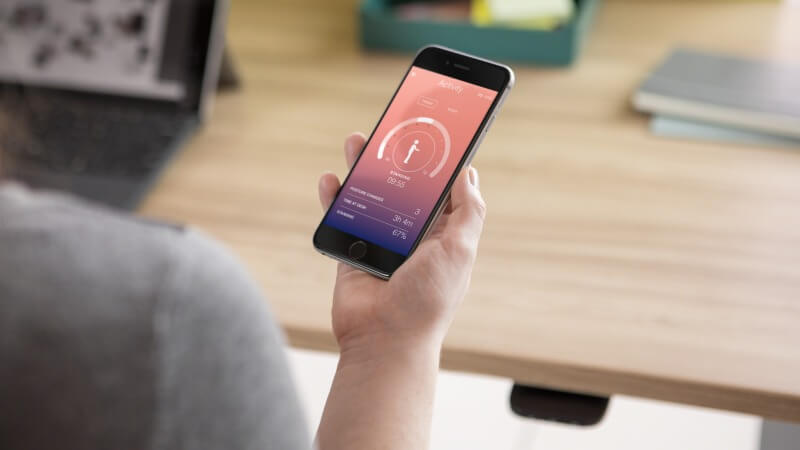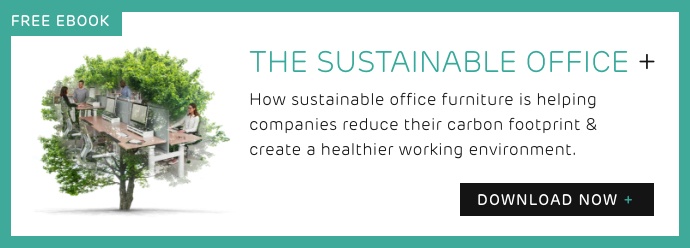Office furniture design is constantly evolving to give employees a better environment to work in. Today, with organisations under more pressure than ever to create better working experiences for their people, office furniture products are becoming more flexible, hygienic, and sustainable. Not to mention smarter.
Let’s take a closer look at what we can expect from office furniture design in 2022 and beyond.
Greater flexibility means more flexible products
The shift to hybrid working is causing companies to look for products that support a flexible workspace. Employees need to be able to move quickly from intense collaboration to individual work with minimum disruption. They need spaces that can morph and change with rotating activities.
The Steelcase Flex range is designed to give workers this level of control. Height-adjustable desks, moveable screens, whiteboards and trolleys, as well as portable power, empower teams to create spaces that can be rearranged on demand.

Other flexible furniture solutions include Pixel building blocks by Bene, which can be combined to create different pieces of furniture as required, be it storage containers, seating or a table.
As well as supporting the changing needs of workers throughout the day, flexible office furniture solutions can also help organisations to future proof their work spaces. As Gensler point out:
“New workspace approaches must be more responsive to rapidly adjust to new ways of working with flexible spaces and furniture for newly emerging work patterns.”
Hygienic strategies are here to stay
Personal protection and safety has become a greater concern within the working environment. Returning to the office post-Covid, employees need to feel and be safe. This has forced companies to pay closer attention to product materials, opting for those that are more hygienic and can be easily cleaned.
Furniture made from antimicrobial materials are a popular choice because they can be easily wiped down and sanitised. The Ology height-adjustable desk from Steelcase is available with antimicrobial protection that is moulded into the desk components to support the wellbeing of users.
%20(1).jpg?width=800&name=My%20project%20(1)%20(1).jpg)
Some companies are also investing in air purifiers as part of a broader proactive hygiene strategy. Poor air quality results not just in colds and flu being spread around, but in impaired cognitive performance at work too. AeraMax Professional® commercial grade air purifiers can reach 99.9% airborne virus reduction within the first 35 minutes of operation.
Sustainability takes precedence
Sustainable office furniture is gaining a great deal of attention. By making sustainable choices, companies can meet ESG targets, boost employee wellbeing, and improve their chances of attracting and retaining top talent.
Jon Wyss, Strategic Projects Director at Insightful Environments explains how the pandemic has encouraged more businesses to prioritise sustainability when choosing office furniture.
“There’s been a huge sea change in terms of client attitudes towards reusing furniture. They are prepared to spend that extra money if it means there will be some kind of saving in the long term, for instance not having to pay for items to be disposed of when they are no longer fit for purpose.
This has changed dramatically during and post-Covid. A lot of it is about saving money but often it’s more about their ESG strategy and being able to put some facts behind their ambitions of being sustainable.”
Research by Steelcase found 70% of leaders agree that sustainability will increase in importance for furniture choices, proving that this is a trend that’s here to stay.
Some of our favourite sustainable office furniture products include:
- The Kirn chair by Orangebox - This chair is primarily made from 100% recycled polymer feedstock, a durable, high quality material that produces 97% less CO2 in its processing than virgin plastics of the same type.

- The Think chair by Steelcase - This chair has been designed to ensure responsible end of use strategies - refurbishing, charitable donation or recycling. Quick and easy to disassemble, plastic parts are clearly labelled for easy sorting and effective recycling.
- The Bamboo modular shelving range by Frovi - Designed with the planet in mind, the range is crafted using recycled ocean plastic, recycled PET Felt and pressed bamboo. It comes with height-adjustable feet and a mobile table for agile working.
.jpg?width=800&name=My%20project%20(3).jpg)
- The Activa Lift 2 Desk by Steeclase - The desk uses powder coating free of VOCs and heavy metals, and the glue used is water based and releases no VOCs.
Furniture is getting smarter
Technology has influenced every aspect of our lives and office furniture is no exception. In the smart office, workers will be able to book a desk before even entering the building. They will be able to control the height of the desk, as well as the heating and lighting settings, all via a simple mobile app.
GoBright, for example, is a space management tool that allows users to book a desk and 'check in' via an online system or mobile app.
%20(1).jpg?width=800&name=My%20project%20(3)%20(1).jpg)
Smart furniture is also helping to improve employee wellbeing. The Steelcase Rise app, for example, syncs with height-adjustable desks and benches, offering a smarter way for employees to own their wellness at work.

Summary
The world of work is changing, and office furniture design is continually evolving to keep pace. We are already seeing designers and manufacturers creating more flexible, hygienic and sustainable products, and seeing a movement towards smarter management of furniture. Going into 2022 and beyond, we can expect this to continue.









